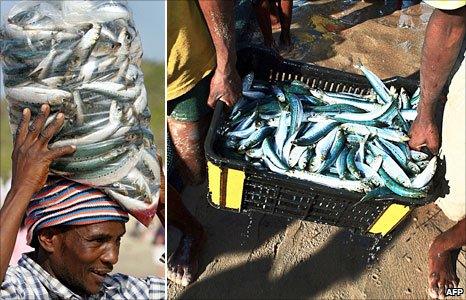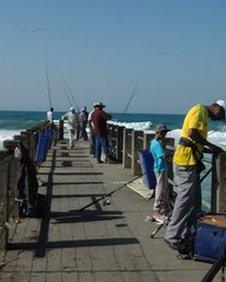Durban fishermen cry foul over 'World Cup ban'
- Published

Angry South African fishermen in Durban have blamed the World Cup for missing out on this year's lucrative "sardine run".
The season runs from May to July when vast shoals with millions of sardines, attracting whales and sharks, migrate in a cold current up the coast towards Mozambique and then into the Indian Ocean.
It provides a livelihood for thousands of fishermen who use the city's beaches for bonanza catches.
Yet this year Durban council has banned the fishermen. It did not answer specific questions on whether the ban was linked to the World Cup, saying it was part of an "upgrade project" for the seafront.
This is the first time such measures have been taken and the fishermen believe it is intended to present a "clean" picture of the beaches and city to the thousands of tourists visiting during the football World Cup.
"It really oppresses us. How does fishing affect the World Cup?" 58-year-old Aman Khan told the BBC.
Police officers enforcing the ban have told the fishermen they often leave the piers dirty which is unsightly for tourists.
But Mr Khan rejects this.
"There are a few who leave litter there but it's not everyone. Surely there are other ways of controlling litter, which are not as extreme as taking food out of our mouths?
"And fishing is a tourist attraction, when they come here we teach them about the fish. They even ask to take pictures of our fish."
'No consultation'
Fellow angler Bob Ali, 55, has been a subsistence fisherman for more than 35 years and says the sardine run is by far the most lucrative time of year for fishermen.
"Thousands of people have been affected by this decision. We were earning an honest living," he says, explaining that he would commute in every day from his home about 40km (about 25 miles) outside Durban to catch the sardines.
Like many of the fishermen, he cannot find formal employment.
With four children and an eight-year-old grandchild to look after, Mr Ali says he has been struggling to put food on the table.
"I've been living from hand to mouth. I cannot even provide for my family any more. How am I expected to feed my family if I cannot fish?"
According to a local fishing board, the South Durban Community Environmental Alliance, external (SDCEA), the no-fishing zones were only announced two weeks before the World Cup kicked off in June.
This put Bay of Plenty, Dairy Beach, North Beach pier and South Beach pier out of bounds - the best fishing spots, fishermen argue, because water levels on these beach fronts are high as they are surrounded by reefs.
Only Snake Park pier is currently open where fishermen cram in, anxious to get a bite.
But it is often a futile exercise because the water is shallow and the area around the pier sanded up.
"The fishermen were never consulted nor any official discussed this ban with them," says SDCEA's Desmond D'Sa.
Night fishing
Anyone caught fishing on the closed off piers faces arrest or having their fishing equipment confiscated.

Only one pier has been left open and the catches there are poor
But this has not deterred some, like Mr Ali. He goes fishing illegally at night, even though he says it is risky because of a heightened police presence.
"We have no choice because we have to feed our children," he says.
Fisherman Max Magnus accuses the Durban city council, known as eThekwini Municipality, of "deprioritising the poor".
"We are just regarded as dirty, unkempt, poor, something that should be kept away from the eyes of the tourists," he says.
But eThekwini Municipality, external says that with all the other activities and swimmers on the beach, the presence of the fishermen made security an issue.
The council said the ban had come out of an overall discussion about policing and refused to comment on whether the fishermen had been consulted.
About 2,000 fishermen are fighting for compensation for lost income and have lodged a complaint with the South African Human Rights Commission.
They fear the fishing ban may become permanent and are organising "defiance campaigns", including trying to fish on closed piers and leading protests outside the municipal offices.
"If they don't want to lift the ban then they must compensate the fisherman," said a fisherman who asked not to be named.
"We won this country over through violence; we will do that again if we have to," he said.
Some of the fishermen argue that fishing is more than a way of life for them; it is their "heritage".
"When you take away somebody's heritage you steal their history - it's wrong and it's devastating for all of us," says Mr Magnus.